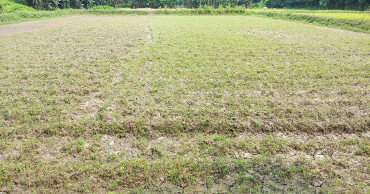Food Crisis
Have sufficient food stock till Ramadan: Cabinet Secy
There will be no food crisis till the next Ramadan in the country, said outgoing Cabinet Secretary Khandker Anwarul Islam on Tuesday.
The food stock position up to next June shows that there will be no food crisis, he told reporters after a meeting of the Committee of Secretaries at the Secretariat.
Read more: IFC giving $32.5 million to ensure food security in Bangladesh
The Agriculture Secretary has been coordinating for the last six months in this regard. “More than 16 lakh tonnes of food remains in stock. So we are in a good situation.”
He said the yield of Aman paddy has been good this year as Aman has been cultivated in the low lands as the drought has been prolonged.
Besides, various food aid services including open market sale (OMS) will continue, he added.
On November 27, all secretaries had a meeting with Prime Minister Sheikh Hasina and a follow-up meeting was held today, said the cabinet secretary.
“We have received a review from all our secretaries on the cost reduction efforts like how entertainment cost is reduced, how electricity bill is reduced, then how much is being reduced in petrol consuming,” he said.
Read more: Russia wants to support countries in energy, food security: Ambassador
It has been possible to reduce the cost of electricity by about 48 percent since June, he said adding that the Prime Minister's office has reduced it by more than 60 percent and 40 percent cost reduction in fuel consumption has been possible, he added.
In the meeting of the secretaries with the Prime Minister, directive was given to get prepared for any possible crisis, he said .
Asked about the crisis, he said, it is not a political issue. If the supply chain is stopped due to any reason, for one or two months, all have been asked to get prepared for that, added the cabinet secretary.
3 years ago
Agriculture minister writes to other ministers to use fallow lands for cultivation
Agriculture Minister Abdur Razzaque has sent demi official (DO) letters to some other ministers to cultivate unused lands of sugar, jute, textile mills and railways to mitigate any possible food crisis.
The minister sent the letter to the ministers for Industries, Textiles and Jute and Railways recently, according to a press release.
In the letters, Abdur Razzaque requested all seeking personal initiative of the ministers mentioning the opportunity of cultivating food grains, vegetables, pulse and, oil seeds in unused lands owned by different government agencies to fight the food crisis in light of global adversities.
He said the initiative can boost the country’s food production and concerned upazila Agricultural Officers of the Agricultural Extension Department will provide necessary assistance in this regard.
Read more: Global food import costs near record $2 trillion, hurting poorest
The letters said global food production and distribution are facing a challenge due to the Russia-Ukraine war and Covid-19.
Along with that price hike of essential materials for food production like fertilizers and fuel have created a fear of food crisis, it said.
Prime Minister Sheikh Hasina has directed to increase the food production and to leave no fallow lands unused to ensure food security, which the Ministry of Agriculture is trying to implement, said Razzaque.
3 years ago
Global food crisis won't seriously harm Bangladesh: Momen
Foreign Minister Dr. AK Abdul Momen said the government can ensure food security in the country despite the fear of a global food crisis.
“Though there is a fear that a global food crisis might be seen in the future because of the Covid-19 pandemic and Russia-Ukraine situation, it will not harm Bangladesh much,” he said.
The foreign minister made the remarks responding to a question from journalists after he inaugurated the works for upgrading the Ambarkhana-Tukerbazar part of Sylhet-Sunamganj road into a four-lane one on Friday afternoon.
He said not a single inch of arable land in Bangladesh will remain uncultivated as the government is trying to ensure food security. “If you can manage food, you can manage anything else,” he added.
Read: We won’t fall prey to Myanmar provocations: Momen
The minister said the GDP growth is above 6 percent in Bangladesh whereas it is around 3 percent in many other countries in the world.
"Bangladesh always works on the basis of reality. So, there is no reason to worry,” he said.
Dr Momen arrived here on Friday afternoon on a two-day tour to Sylhet.
3 years ago
ADB plans to provide $14 billion to ease worsening food crisis in Asia
The Asian Development Bank (ADB) on Tuesday announced plans to provide at least $14 billion over 2022–2025 to ease a worsening food crisis in Asia and the Pacific, and improve long-term food security.
The assistance expands ADB’s already significant support for food security in the region, where nearly 1.1 billion people lack healthy diets due to poverty and food prices which have soared to record highs this year.
Read:Bangladesh’s GDP likely to grow by 6.6% in FY 2023: ADB
The funding will be channeled through existing and new projects in sectors including farm inputs, food production and distribution, social protection, irrigation, and water resources management, as well as projects leveraging nature-based solutions.
ADB said it will continue to invest in other activities which contribute to food security such as energy transition, transport, access to rural finance, environmental management, health, and education.
“This is a timely and urgently needed response to a crisis that is leaving too many poor families in Asia hungry and in deeper poverty,” said ADB President Masatsugu Asakawa, in remarks at ADB’s 55th Annual Meeting.
“We need to act now, before the impacts of climate change worsen and further erode the region’s hard-won development gains. Our support will be targeted, integrated, and impactful to help vulnerable people, particularly vulnerable women, in the near-term, while bolstering food systems to reduce the impact of emerging and future food security risks.”
The situation in Ukraine has disrupted supplies of food staples and fertilizer, straining a global food system already weakened by climate change impacts, pandemic-related supply shocks, and unsustainable farming practices.
Asia and the Pacific is vulnerable to food shocks, as some of its countries depend on imported staples and fertilizer.
Read:ADB provides assurances of $2 billion in budget support
Even before the invasion of Ukraine, nutritious food was unaffordable for significant portions of the population in many ADB low-income member countries.
As well as supporting vulnerable people, ADB’s food security assistance will promote open trade, improve smallholder farm production and livelihoods, ease shortages of fertilizer and promote its efficient use or organic alternatives, support investments in food production and distribution, enhance nutrition, and boost climate resilience through integrated and nature-based solutions.
A key focus will be to protect the region’s natural environment from climate change impacts and biodiversity loss, which have degraded soils, freshwater, and marine ecosystems.
“An important part of our long-term approach is to safeguard natural resources and support farmers and agribusinesses which produce and distribute much of the region’s food, and to promote open trade to ensure it reaches consumers efficiently,” said Mr. Asakawa.
Assistance under the program will start this year and continue through 2025.
It will be drawn from across ADB’s sovereign and private sector operations, and seek to leverage an additional $5 billion in private sector cofinancing for food security.
ADB will apply lessons learned from supporting its members during the global food crisis in 2007–2008 and through the implementation of its food security operational plan the following year.
Since then, ADB has provided $2 billion in annual investments in food security. In 2018, ADB identified food security as a key operational priority.
3 years ago
Drought hampering Aman production in Bagerhat
A debacle in Aman paddy production is raising fears of an upcoming food crisis in Bagerhat.
This year, rainfall in Bagerhat was 489mm less than last year. As a result, although the Aman season is nearing its end, around 40 percent of agricultural land in the district is lying uncultivated due to a drought-like situation.
Lack of water is making it hard for farmers to plant Aman seedlings, and those who’ve already planted the seedlings are watching their crops becoming yellow and drying up.
Read: Drought-like situation frustrates Aman growers in Naogaon
Amid such a situation, the Department of Agricultural Extension (DAE) is thinking of bringing changes to the paddy growing process and artificially inducing rainfall.
According to the DAE, there are a total of 2,44,328 farming families in Bagerhat. The season for planting Aman seedlings runs between July 1 and September 15. This year, the government had set a target to cultivate 2,66,980 metric tons of Aman paddy in 74,425 hectares of land, among which only 41,000 hectares of land has been cultivated till now.
Besides, Bagerhat has witnessed 2538mm rain from May to August this year, which was 3027mm during the same period in the previous year. This means that there has been 489mm less rain in the district this season, which has affected the production of Aman paddy to a great extent.
While visiting Bagerhat’s Kochua and Fakirhat upazilas, UNB found that cracks and weeds have emerged in all the paddy fields there. Farmers, worried about food shortage, were trying to save their seedlings through irrigation. The same scenario prevailed in the district’s Sadar, Sharankhola and Mollarhat upazilas too.
Sheikh Asadur Rahman, a local farmer, plants paddy in five acres of land every year. He runs his family by consuming and selling the rice grown on his land. This year, Asad is facing dual crises. While the seedbed that he had prepared for the first time got wasted due to the water crisis, the seedbed that he prepared the second time is being eaten up by domestic animals.
“Seedlings can’t be implanted on dry land. I couldn’t implant any seedlings this season due to a lack of water. The Aman farming season is nearing its end, which means I won’t be able to cultivate any paddy this year. I don’t know how I will survive,” Asad said.
Swapan Das, Chairman of Fakirhat Upazila Parishad, has seen the farming methods of many countries. While talking to UNB, he provided some ideas to mitigate the farming crisis that is going on in the district.
Read: Scanty rains worry Aman, Jute growers in Thakurgaon
“New variants of paddy have to be invented through conducting research on water and soil. Solar energy has to be used in ensuring water supply through irrigation. Besides, subsidies in the current method of irrigation have to be increased and the price of electricity has to be lowered,” said Swapan.
Md Azizur Rahman, Deputy Director of Bagerhat’s Department of Agricultural Extension (DAE), suggested water pumps to be used in paddy farming to deal with the water crisis.
“To mitigate the losses, we’ve advised the farmers to cultivate the BR-23 variant of paddy and irrigate their lands using water pumps. Currently, a total of 4,500 water pumps are running in the district,” Azizur said.
Azizur added that the period for implanting seedlings has been extended to September 30.
“We have to wait till the harvesting period to know whether the government will miss its target for Aman production this year or not,” added Azizur.
3 years ago
Work for more food production amid looming crisis, PM Hasina urges BCL members
Prime Minister Sheikh Hasina on Wednesday asked Bangladesh Chhatra League (BCL), the student wing of her ruling Awami League, to work for boosting food production in the country as the world might face a deeper food crisis.
“If needed, our Chhatra League will have to help farmers plant paddy seedlings as they did in harvesting paddy (during the Covid-19 period),” she said.
The premier was addressing a discussion organised by BCL at Bangabandhu International Conference Centre here to mark the National Mourning Day of August 15, the day the country’s architect Bangabandhu Sheikh Mujibur Rahman was assassinated along with most members of his family in 1975.
Hasina, also the AL president, asked every BCL member to plant trees massively besides cultivating crops and thus increase food production in respective village home and the place of living – it may be a hostel or educational institute.
This is needed as the world might witness a dire situation and the foods might not be purchased despite having money. “So, we will have to produce our own foods,” she added.
The PM also asked the BCL members to exercise austerity in the use of electricity, water and fuels amid the world economic crisis.
She urged the BCL members to build them as worthy citizens by attaining proper education. “I want skilled human resources and that is why I’ve established lots of universities to meet the demand as it is time for science and technology and 4IR,” she said.
Describing BCL as a large organisation, the prime minister said many outsiders infiltrated into it as Awami League has been in power for a long time. Infiltrators make trouble, but BCL is to bear its blame, she said.
Read: PM participates in extended discussion in JS on global roots of local suffering
Hasina asked the BCL leaders not to allow infiltration of bad guys into the organisation for strengthening their own groups. “If you do it, it will ultimately invite bad names for yourself, the organisation and the country,” she said.
“There is no word (criticism) about so many misdeeds Chhatra Dal did in the past. But if a trivial matter occurs in Chhatra League, big news stories are run,” she said, asking the BCL leaders to be careful of its image.
The PM urged the BCL leaders to be imbued with patriotism, non-communal spirit and the ideology of the Liberation War in order to acquire true leadership quality for leading the country rightly in future.
Noting that there is no use of money and assets in many cases, she said, “If anyone can go above personal desire and gain, he or she would be able to develop him or her as a true leader.”
About the August 15 carnage, Hasina said her father Bangabandhu Sheikh Mujib could never believe that any Bengali could kill him. He had brought the independence of the country and always lead a very simple life despite being the president and the prime minister of this country, she said.
Recalling the contribution of Bangamata Sheikh Fazilatunnesa to the struggle for freedom, Hasina said her mother used to take care of not only her family but also the organisation when her father was in jail.
The PM said her mother had never bothered her father over the familial affairs. Bangamata had helped her husband make timely and right decisions regarding national life and the freedom struggle.
“The dedication of my mother is incomparable. My father was very lucky that my mother had no personal desire or never wanted anything for her personal interest,” she said.
The premier also unveiled BCL's two publications -"Matribhumi" and "Joy Bangla" at the event.
BCL president Al-Nahean Khan Joy presided over the function, moderated by its general secretary Lekhak Bhattacharjee.
3 years ago
Ukraine grain shipments offer hope, not fix to food crisis
A ship bringing corn to Lebanon’s northern port of Tripoli normally would not cause a stir. But it's getting attention because of where it came from: Ukraine’s Black Sea port of Odesa.
The Razoni, loaded with more than 26,000 tons of corn for chicken feed, is emerging from the edges of a Russian war that has threatened food supplies in countries like Lebanon, which has the world's highest rate of food inflation — a staggering 122% — and depends on the Black Sea region for nearly all of its wheat.
The fighting has trapped 20 million tons of grains inside Ukraine, and the Razoni's departure Monday marked a first major step toward extracting those food supplies and getting them to farms and bakeries to feed millions of impoverished people who are going hungry in Africa, the Middle East and parts of Asia.
“Actually seeing the shipment move is a big deal,” said Jonathan Haines, senior analyst at data and analytics firm Gro Intelligence. “This 26,000 tons in the scale of the 20 million tons that are locked up is nothing, absolutely nothing ... but if we start seeing this, every shipment that goes is going to increase confidence.”
The small scale means the initial shipments leaving the world's breadbasket will not draw down food prices or ease a global food crisis anytime soon. Plus, most of the trapped grain is for animal feed, not for people to eat, experts say. That will extend the war's ripple effects for the world’s most vulnerable people thousands of miles away in countries like Somalia and Afghanistan, where hunger could soon turn to famine and where inflation has pushed the cost of food and energy out of reach for many.
To farmers in Lebanon, the shipment expected this weekend is a sign that grains might become more available again, even if at a higher price, said Ibrahim Tarchichi, head of the Bekaa Farmers Association.
But he said it won’t make a dent in his country, where years of endemic corruption and political divides have upended life. Since 2019, the economy has contracted by at least 58%, with the currency depreciating so severely that nearly three-quarters of the population now lives in poverty.
“I think the crisis will continue as long as operating costs continue to soar and purchasing power falls,” Tarchichi said.
The strife was on sharp display this week when a section of Beirut’s massive port grain silos collapsed in a huge cloud of dust, two years after an explosion killed more than 200 people and wounded thousands more.
While symbolic, the shipments have done little to ease market concerns. Drought and high fertilizer costs have kept grain prices more than 50% higher than early 2020, before the COVID-19 pandemic. And while Ukraine is a top supplier of wheat, barley, corn and sunflower oil to developing countries, it represents just 10% of the international wheat trade.
There’s also little to suggest that the world’s poorest who rely on Ukrainian wheat distributed through U.N. agencies like the World Food Program will be able to access them anytime soon. Before the war, half of the grain the WFP purchased for distribution came from Ukraine.
The Razoni's safe passage was guaranteed by a four-month-long deal that the U.N. and Turkey brokered with Ukraine and Russia two weeks ago. The grain corridor through the Black Sea is 111 nautical miles long and 3 nautical miles wide, with waters strewn with drifting explosive mines, slowing the work.
Read: 3 more ships with grain depart Ukraine ports under UN deal
Three more ships departed Friday, heading to Turkey, Ireland and the United Kingdom. All the ships that have departed so far had been stuck there since the war began nearly six months ago.
Under the deal, some — not all — of the food exported will go to countries experiencing food insecurity. That means it could take weeks for people in Africa to see grain from the new shipments and even longer to see the effects on high food prices, said Shaun Ferris, a Kenya-based adviser on agriculture and markets for Catholic Relief Services, a partner in World Food Program distributions.
In East Africa, thousands of people have died as Somalia and neighboring Ethiopia and Kenya face the worst drought in four decades. Survivors have described burying their children as they fled to camps where little assistance could be found.
After Russia invaded Ukraine, Somalia and other African countries turned to non-traditional grain partners like India, Turkey and Brazil, but at higher prices. Prices of critical foods could start to go down in two or three months as markets for imported food adjust and local harvests progress, Ferris said.
Who is first in line for the grain from Ukraine could be affected by humanitarian needs but also comes down to existing business arrangements and commercial interests, including who is willing to pay the most, Ferris said.
“Ukraine is not a charity,” he said. “It will be looking to get the best deals on the market” to maintain its own fragile economy.
The WFP said this week that it’s planning to buy, load and ship 30,000 tons of wheat out of Ukraine on a U.N.-chartered vessel. It did not say where the vessel would go or when that voyage might happen.
In Lebanon, where humanitarian aid group Mercy Corps says the price of wheat flour has risen by more than 200% since the start of Russia’s war, people stood in long, often tense lines outside bakeries for subsidized bread in recent days.
The government green-lit a $150 million World Bank loan to import wheat, a temporary solution of six to nine months before it could be forced to lift subsidies on bread altogether.
While the situation is hard for millions of Lebanese, the country’s roughly 1 million Syrian refugees who fled a civil war across the border face stigmatization and discrimination trying to buy bread.
A Syrian living in northern Lebanon said it often takes him three to four visits to bakeries before he finds someone willing to sell him bread, with priority given to Lebanese. He described lines of 100 people waiting and only a handful being allowed in every half-hour to buy a small bundle of loaves.
“We get all sorts of rude comments because we’re Syrian, which we usually just ignore, but sometimes it gets too much and we decide to go home empty-handed,” he said, speaking on condition of anonymity for fear of reprisal.
3 years ago
Flood waters receding again in Sylhet but food, water crises persist
As the sun came out Saturday in Sylhet after four more days of heavy rain, the water level in all rivers and flood-hit areas started receding but that hardly eased the non-stop struggle life has been for its residents, many of them in areas cut off by waterlogging, since mid-June with food and fresh water crises still persisting.
Until Friday morning total fatalities from the devastating flood rose to 95 with three more deaths from drowning and lightning strikes in the country, said the Directorate General of Health Services DGHS).
According to the Water Development Board (WDB) in Sylhet, from Friday 6 am to Saturday 9 am water level decreased 11 cm at Sylhet point and 10 cm at Kanaighat point of the Surma river. Meanwhile the Kushiara river’s water level lowered 16 cm at Amalsid point, 5 cm at Sheola point, and 2 cm at Fenchuganj point. Lobha, Sari, and Dhalai rivers were also showing a receding trend.
Also read: Floods wash away crops and hopes in Kurigram
Asif Ahmed, executive engineer of Sylhet WDB, said, “The water is receding slowly but the flood situation is not expected to deteriorate in the next few days.”
Due to heavy rains from June 15, and upstream water running down from India, Sylhet and other north-eastern districts of the country faced the most devastating flood in living memory. For almost 17 days 80 per cent of the district remained under water and normal life there came to a complete standstill.
As tube wells of the flood-hit region also submerged, an extreme crisis of drinkable water and food became imminent in Sylhet.
“Total 99 unions of 13 upazilas in the district were flooded. Of the 35,000 government tube wells in the district 27,000 were submerged along with 2,000 more private ones,” told Alamgir Hossain, executive engineer of district Department of Public Health Engineering.
He said, “Eight mobile water treatment plants with capacity to supply 5,000 liters of water each have been received from the government. Of them six has been distributed to flood hit Sylhet city, COmpaniganj, Gowainghat, Kanaighat, Bishwanath, Fenchuganj and another two have been kept in reserve”.
“We are campaigning to teach the steps to purify tube well water after flood water recedes,” he added.
Ismail Ali, from Tererton area in the city said, “For eight days my house was under water and we just started cleaning the house today.”
He mentioned another problem that came up with receding water - an all-encompassing, unbearable stench from rotten wastes.
Nur Azizur Rahman, chief engineer of Sylhet City Corporation said “The city corporation is conducting a cleaning drive of the garbage from the canal and other water bodies. The whole city will be cleaned with bleaching powder.”
Also read: More rain forecast, but flood situation likely to improve in 6 districts Saturday
Meanwhile, Mukul Ahmed, a trader from Bangabir road said, “Though water went down from my shop the roads remained submerged for the 17 th day. My business has completely gone down and I don't know how many days the situation will remain like this.”
3 years ago
Food security requires sharing tried-and-tested knowledge with informed policymaking
Experts and agricultural journalists from Bangladesh, Indonesia and the Philippines have stressed the importance of evidence-based knowledge sharing and informed policy decisions to ensure sustainable food security.
They also laid emphasis on a better understanding of agricultural biotechnology and relevant policy issues.
Farming Future Bangladesh in collaboration with the U.S. Department of Agriculture, U.S. Agency for International Development, and U.S. Department of State, organized the regional media roundtable titled, “The Role of Innovative Technologies in Addressing Agricultural Challenges" on Monday.
The roundtable followed previous country-specific “virtual tours” organized in Bangladesh, Indonesia, and the Philippines to encourage collaboration between journalists, farmers, and scientists on educating the public about the benefits and importance of agricultural biotechnology.
“The media plays an important role in reaching and engaging a wide range of audiences and stakeholders with science and fact-based reporting and debunking myths about agricultural biotechnology and agricultural innovations,” said Helen LaFave, Deputy Chief of Mission at U.S. Embassy in Dhaka.
She also said “biotechnology offers proven and effective tools to sustainably expand production, address global hunger and nutritional deficiencies, and respond to adverse growing conditions.”
Media experts on agriculture interacted with speakers and expressed their views on consumer acceptance and effective marketing of genetically engineered crops.
Also Read: Russia slams sanctions, seeks to blame West for food crisis
The group emphasized publishing more research-based work to allow consumers to differentiate between the myths and facts about gene edited crops.
Participants exchanged their views and proposed ways forward on agricultural innovation and sustainable agricultural practice.
Md. Arif Hossain, CEO & Executive Director of Farming Future Bangladesh, moderated the virtual round table discussion.
Scientists and experts from Indonesia, Philippines, and Bangladesh also gave technical presentations on effective applications of agricultural biotechnology in their respective countries.
3 years ago
UN: Climate shocks, war fuel multiple looming food crises
Two U.N. food agencies issued stark warnings Monday about multiple, looming food crises on the planet, driven by climate “shocks” like drought and worsened by the impacts of the COVID-19 pandemic and the war in Ukraine that have sent fuel and food prices soaring.
The glum assessment came in a report by two Rome-based food agencies: the World Food Program (WFP) and the Food and Agriculture Organization (FAO).
WFP Executive Director David Beasley said besides hurting “the poorest of the poor” the global food crises threaten to overwhelm millions of families who are just getting by.
Also read: War in Ukraine adds to food price hikes, hunger in Africa
“Conditions now are much worse than during the Arab Spring in 2011 and 2007-2008 food price crisis, when 48 countries were rocked by political unrest, riots and protests,” Beasley said in a statement. He cited as “just the tip of the iceberg” food crises now in Indonesia, Pakistan, Peru and Sri Lanka.
The report calls for urgent humanitarian action to help “hunger hotspots” where acute hunger is expected to worsen over the next few months.
The U.N. agencies are also warning that war in Ukraine, which was invaded by Russia in February, has exacerbated already steadily rising food and energy prices worldwide.
“The effects are expected to be particularly acute where economic instability and spiraling prices combine with drops in food production due to climate shocks such as recurrent droughts or flooding,” the joint statement from the U.N. agencies said.
Among critical areas cited is East Africa, where the United Nations said an “unprecedented” drought is afflicting Somalia, Ethiopia and Kenya. South Sudan, meanwhile, faces a fourth straight year of large-scale flooding.
The report cited other sobering climate impacts: above-average rain and a risk of localized flooding in the Sahel, a vast swath of Africa stretching south of the Sahara Desert.
It also cited a more intense hurricane season in the Caribbean and below-average rainfall in Afghanistan. That Asian country is already suffering through multiple seasons of drought, violence and political upheaval, including after the return of Taliban rule last summer.
Also read: Russia slams sanctions, seeks to blame West for food crisis
The report tagged six nations as “highest alert” hot spots facing catastrophic conditions: Ethiopia, Nigeria, South Sudan, Yemen, Afghanistan and Somalia. It said as many as 750,000 people are facing starvation and death in those countries. Of those, 400,000 are in Ethiopia's embattled Tigray region — the highest number on record in any one country since the 2011 famine in Somalia, the U.N. agencies said.
In April, according to a study by regional health officials that was seen by The Associated Press, at least 1,900 children under 5 died from malnutrition in the Tigray region. Western Tigray, which is under the control of forces from the neighboring Amhara region, was not included in that survey.
The U.N. food agencies report Monday said Congo, Haiti, the Sahel region, Sudan and Syria remain “of very high concern" and noted that Kenya was a new entry to that list.
Joining the list of hot spot countries were Sri Lanka, Benin, Cape Verde, Guinea, Ukraine and Zimbabwe, while areas that faced continuing food scarcities included Angola, Lebanon, Madagascar and Mozambique.
3 years ago














